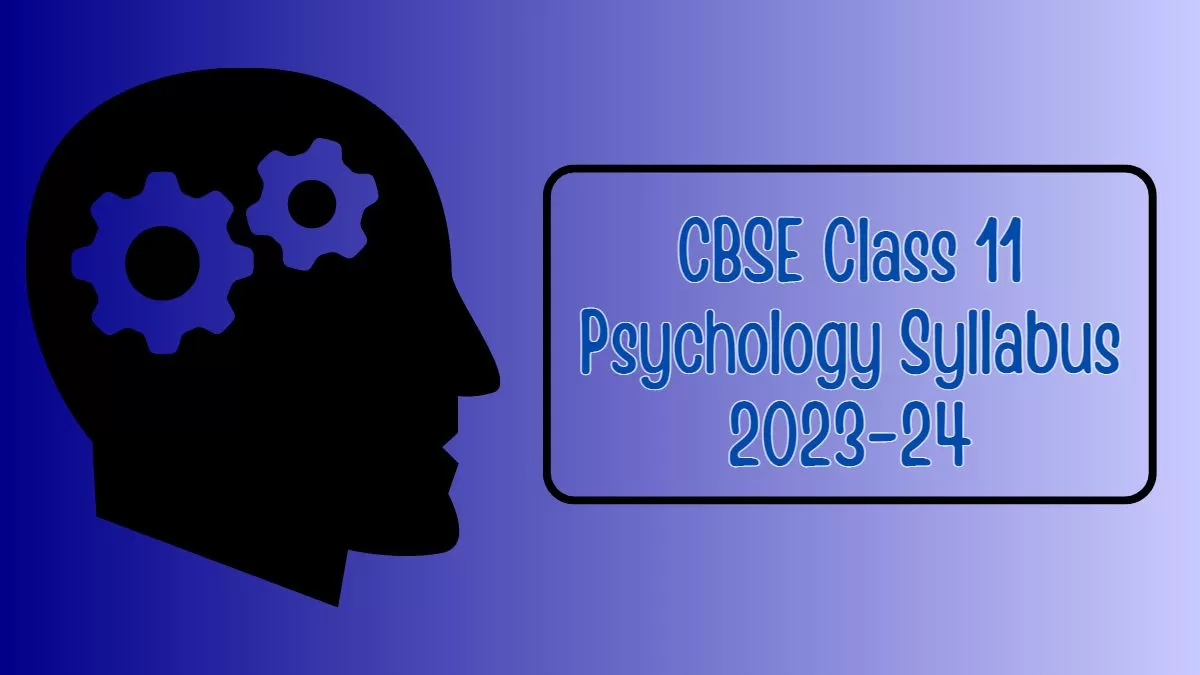CBSE Class 11 Psychology Syllabus 2024: Psychology has been one of the emerging fields of interest among the currency generation of students. It is a specialised discipline that focuses on studying the experiences, behaviours, and mental processes of human beings within a socio-cultural and historical context. By offering Psychology to its senior secondary students, CBSE aims to introduce learners to the fundamental concepts, principles, and methods used in psychology. The primary aim is to generate interest and provide exposure to learners, enabling them to build their own knowledge base and understanding required for further studies in class 12th and at college/ university level. The course has been designed to explore psychological knowledge and practices deeply embedded in specific contexts. In this article, students can check the complete 11th class CBSE Psychology syllabus 2023-24 and download its PDF for free.
CBSE Class 11 Psychology 2023-24 Course Structure
| Units | Topics | Marks |
| I | What is Psychology? | 11 |
| II | Methods of Enquiry in Psychology | 13 |
| IV | Human Development | 11 |
| V | Sensory, Attentional and Perceptual Processes | 8 |
| VI | Learning | 9 |
| VII | Human Memory | 8 |
| IX | Thinking | 5 |
| X | Motivation and Emotion | 5 |
| TOTAL | 70 |
CBSE Class 11 Psychology 2023-24 Course Content
UNIT 1 What is Psychology? | ||||||||||
| The topics in this unit are: 1. Introduction 2. What is Psychology?
3. Understanding Mind and Behaviour 4. Popular Notions about the Discipline of Psychology 5. Evolution of Psychology 6. Development of Psychology in India 7. Branches of Psychology 8. Psychology and Other Disciplines 9. Psychology in Everyday Life | ||||||||||
UNIT 2 Methods of Enquiry in Psychology | ||||||||||
| The topics in this unit are: 1. Introduction 2. Goals of Psychological Enquiry
3. Nature of Psychological Data 4. Some Important Methods in Psychology
5. Analysis of Data
6. Limitations of Psychological Enquiry 7. Ethical Issues | ||||||||||
UNIT 4 Human Development | ||||||||||
| The topics in this unit are: 1. Introduction 2. Meaning of Development
3. Factors Influencing Development 4. Context of Development 5. Overview of Developmental Stages
| ||||||||||
UNIT 5 Sensory, Attentional and Perceptual Processes | ||||||||||
| The topics in this unit are: 1. Introduction 2. Knowing the world 3. Nature and varieties of Stimulus 4. Sense Modalities
5. Attentional Processes
6. Perceptual Processes
7. The Perceiver 8. Principles of Perceptual Organisation 9. Perception of Space, Depth and Distance
10. Perceptual Constancies 11. Illusions 12. Socio-Cultural Influences on Perception | ||||||||||
UNIT 6 Learning | ||||||||||
| The topics in this unit are: 1. Introduction 2. Nature of Learning 3. Paradigms of Learning 4. Classical Conditioning Determinants of Classical Conditioning 5. Operant/Instrumental Conditioning
6. Observational Learning 7. Cognitive Learning 8. Verbal Learning 9. Skill Learning 10. Factors Facilitating Learning 11. Learning Disabilities | ||||||||||
UNIT 7 Human Memory | ||||||||||
| The topics in this unit are: 1. Introduction 2. Nature of memory 3. Information Processing Approach : The Stage Model 4. Memory Systems : Sensory, Short-term and Long-term Memories 5. Levels of Processing 6. Types of Long-term Memory
7. Nature and Causes of Forgetting
8. Enhancing Memory
| ||||||||||
UNIT 8 Thinking | ||||||||||
| The topics in this unit are: 1. Introduction 2. Nature of Thinking
3. The Processes of Thinking 4. Problem Solving 5. Reasoning 6. Decision-making 7. Nature and Process of Creative Thinking
8. Thought and Language 9. Development of Language and Language Use | ||||||||||
UNIT 9 Motivation and Emotion | ||||||||||
| The topics in this unit are: 1. Introduction 2. Nature of Motivation 3. Types of Motives
4. Maslow’s Hierarchy of Needs 5. Nature of Emotions 6. Expression of Emotions
7. Managing Negative Emotions 8. Enhancing Positive Emotions | ||||||||||
Practical (Projects, experiments, small studies, etc.)30 marksThe students shall be required to undertake one project and conduct two experiments. The project would involve the use of different methods of enquiry like observation, survey, interview, questionnaire, small studies related to the topics covered in the course (e.g. Human development, Learning, Memory, Motivation, Perception, Attention and Thinking). Experiments could focus on cause-and-effect relationship. | ||||||||||
Practical Examination
|
CBSE Class 11 Psychology Question Paper Design 2023-24
I Theory | ||
| Time 3 hours Max Marks 70 | ||
| Competencies | Marks | Weightage% |
| Remembering and Understanding:Exhibiting memory of previously learned material by recalling facts, terms, basic concepts, and answers. Demonstrating understanding of facts and ideas by organizing, comparing, translating, interpreting, giving descriptions, and stating main ideas | 25 | 35 |
| Applying: Solve problems to new situations by applying acquired knowledge, facts, techniques and rules in a different way. | 31 | 45 |
| Formulating, Analysing, Evaluating and Creating:Examining and breaking information into parts by identifying motives or causes. Make inferences and find evidence to support generalizations. Presenting and defending opinions by making judgments about information, validity of ideas, or quality of work based on a set of criteria. Compiling information together in a different way by combining elements in a new pattern or proposing alternative solutions. | 14 | 20 |
| Total | 70 | 100 |
II Practicals: 30 Marks | ||
CBSE Class 11 Psychology Syllabus 2024 PDF Download
Download CBSE Class 11 Psychology Syllabus PDF 2023-24 |
Also check:
